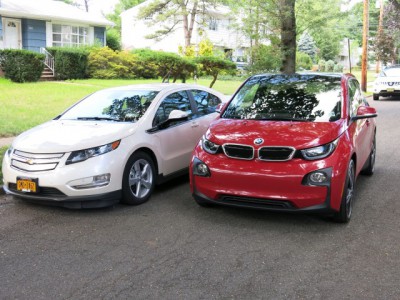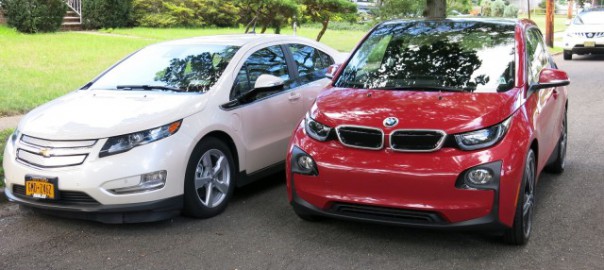Electric Cars Are City Cars? Not In U.S.: They’re Suburb Cars Here
Automotive journalists who write about electric cars hear the phrase “city car” a lot.
As in, “Battery-electric cars are perfect city cars, but [fill in different powertrain] is required for other uses.”
There’s just one problem: No one in the U.S. has ever turned to their better half and said, “Honey, let’s go buy a city car.”
A recent blog post by electric-car advocate and restauranteur Tom Moloughney points out that, in fact, electric cars are largely used in the suburbs here in the U.S.
His article expands on comments to trade journal Automotive News by BMW’s U.S. CEO, Ludwig Willisch, that the company’s BMW i3 battery-electric car has not caught on in the “big urban centers in the Northeast,”
Instead, BMW sells the largest numbers of i3s in areas of California, Texas, and southern Florida.

(Willisch also then suggests that Northeasterners aren’t particularly concerned about the environment and sustainability–conflating desire for electric cars with solely environmental concerns, while overlooking the practical challenges of owning and recharging them in city centers.)
Moloughney notes that dense urban centers–like those of Boston, Manhattan, and San Francisco–are some of the most challenging places to own any car, let alone a plug-in electric car that requires a charging station.
The BMW i3 Moloughney drives was originally developed as the “Megacity Car,” intended for use in future cities of 15 million or more people that are even more densely packed than today.
But his arguments underscore a unique challenge to selling electric cars with ranges of 62 to 100 miles to U.S. drivers: We don’t buy “city cars.” We just buy cars.
In Western Europe, where local, regional, and long-distance mass transit is common, clean, punctual, and a regular part of travel patterns, a much smaller car for short local trips can make sense.
That was the idea behind the 8-foot-8-inch-long Smart ForTwo (which has been completely redesigned for the first time since the late 1990s for the 2016 model year).
You see Smarts all over Amsterdam, London, Paris, and Rome, sometimes parked end-in at the curb.
In the U.S., not so much. They’re no cheaper than larger subcompact cars, so they’re almost entirely restricted to those same dense urban centers where minimal length is a huge advantage for street parking, but recharging is scarce and expensive.
In fact, very small cars of any kind have largely been a sales flop in this country. Toyota’s Smart competitor, the Scion iQ “3+1-seat” minicar, has now been pulled off sale.
Moloughney’s post is worth reading because it underscores the challenges facing all automakers as their executives grapple with the very real challenges of understanding who buys electric cars, how they use them, and what specific challenges they face in making them practical.
Upcoming longer-range battery electric cars–including the 2017 Chevrolet Bolt, for which 200 miles of range has been promised, and the second-generation Nissan Leaf–may make electric cars more broadly palatable to buyers for whom a range of less than 100 miles is a dealbreaker.
But for North American marketing, we’d suggest that automakers simply eradicate the phrase “city car” from their lexicon.
Thus far, electric cars are largely bought by relatively affluent suburban buyers for whom off-street charging at their homes is possible.
Urban dwellers, meanwhile, are starting to participate in car-sharing programs that eliminate the need for them to pay for and store a vehicle they may not use for commuting.
And until there are far more publicly-available plug-in vehicle charging stations–and most likely the far faster DC quick-charging stations–the city centers of Boston, San Francisco, and so forth will remain a far more challenging place to own electric cars.
In other words: No. More. City. Cars. Please.
Source: Green Car Reports
